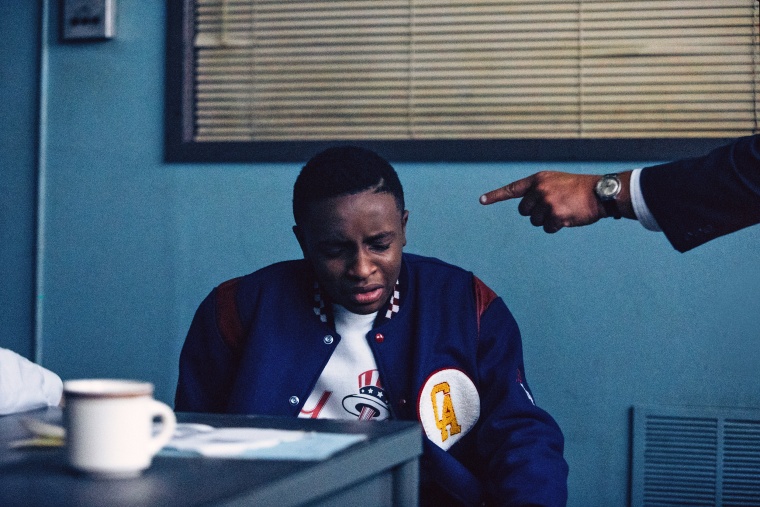Ava DuVernay’s four-part Netflix series “When They See Us,” about the so-called Central Park Five, forces Americans to consider that not all horror stories are fictional. In a country where young black boys and men have been routinely sacrificed to feed the awful beast of racism, the story of wrongfully convicted Kevin Richardson, Yusef Salaam, Raymond Santana Jr., Antron McCray and Korey Wise (formerly Kharey Wise), who ranged from ages 14 to 16 when they were arrested, is not an unfamiliar one. Black boys and men have been falsely accused of raping white women throughout history — with brutal consequences. Within that context, DuVernay’s dose of corrective history is even more compelling.
Abandoning Hollywood’s white savior trope, DuVernay boldly forces viewers to visually and often viscerally walk in the footsteps of that night’s other victims.
From the beginning, the acclaimed filmmaker, whom the men themselves handpicked to tell their story via tweet, veers from familiar territory. DuVernay goes on the offensive, offering glimpses of their lives prior to the disruption of their childhoods, thereby reclaiming their voices. Abandoning Hollywood’s white savior trope, DuVernay boldly forces viewers to visually and often viscerally walk in the footsteps of that night’s other victims. The result is a jarring, unflinching examination of race, class and most importantly, the criminal justice system. (These are topics she’s explored before, most notably in her 2016 Netflix doc, “13th.”)
Speaking with GQ in a joint interview with her adult cast — Chris Chalk, Jharrel Jerome, Freddy Miyares, Jovan Adepo and Justin Cunningham — DuVernay explained why she decided against titling her series the “Central Park Five.” She explained that she “wasn’t interested in assigning a name that was given to these men by the state, really, and by journalists. It was a moniker that I felt further dehumanized them. I want you to know their names, and I want you to see them.”
Specifically, she wants us to see them as the young boys they were and employs two casts to drive this point home. The youth element deepens the horror of their police interrogations and confessions. It’s a perspective so familiar to many black and brown communities that it’s difficult to watch the limited series in one sitting. At an Atlanta screening of two episodes, some members of the overwhelming black audience were so shaken they had to leave the room briefly. Others silently wept as they watched. Social media response has also been strong.
The struggle is all-encompassing and emotionally exhausting. As the boys’ families attempt to retain legal counsel, the naïve hope that the truth will win gradually dies. The lengths to which law enforcement and prosecutors, especially Linda Fairstein (the head of the sex crimes unit in the Manhattan District Attorney’s office), go to pin the savage rape of Trisha Meili on five innocent boys is startling.
Highlighting the presumed guilt, not innocence, of black and brown boys is another critical point for DuVernay. To drive that home, she calls upon the well-documented efforts of Donald Trump, who advocated for the state’s reinstatement of the death penalty in the case.
Want more articles like this? Sign up for the THINK newsletter to get weekly updates on the best pop culture news and analysis
Ultimately, though, DuVernay is most concerned with illuminating the impact of the presumption of guilt. In one powerful scene, Michael K. Williams’s Bobby McCray takes the stand during his son Antron’s trial to explain why he ordered his innocent son to tell the officers what they wanted to hear. It’s a moment that reveals how embedded racism can turn loved ones into enablers. His efforts underscore the insanity of institutionalized racism — marginalized people must often rely on the people who have consistently harmed them to also save them.
There are just so many layers to this ordeal. After the boys are convicted, they struggle to survive incarceration. John Leguizamo as Raymond Santana Sr. attempts to father his son via telephone despite the mounting bills. And when four of the five young men come home several years later, their freedom proves conditional as the weight of life as convicted felons, and registered sex offenders, proves almost as imprisoning as the bars themselves.
As the only one of the five convicted as an adult, Wise’s ordeal, which spans over a decade, is harrowing and rightfully takes center stage in the final episode. In prison, he is exploited by the prison guards, and repeatedly brutalized by inmates more than twice his age, making solitary confinement his only reprieve. There he fights off the psychological torture of loneliness and isolation as he struggles to hang on to his fleeting sanity.
Even though the real rapist finally comes forward to exonerate the five, there’s no happy ending here. No amount of money can bring back their stolen childhoods. With “When They See Us,” DuVernay beckons us all to do more than just revisit a horrible story. Instead she issues a national challenge: We must rally the best of us if we are to defeat our society's worst demons.
